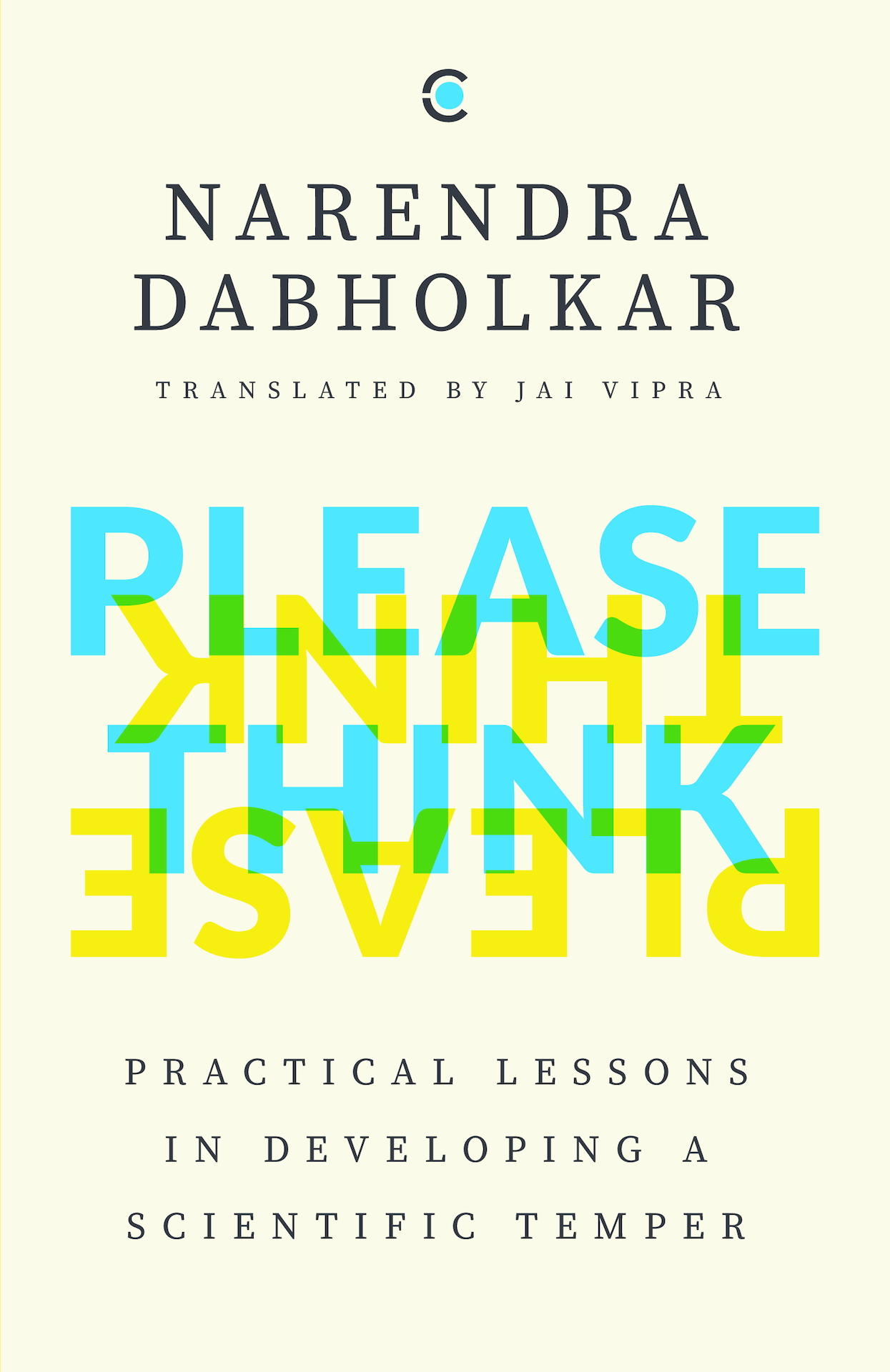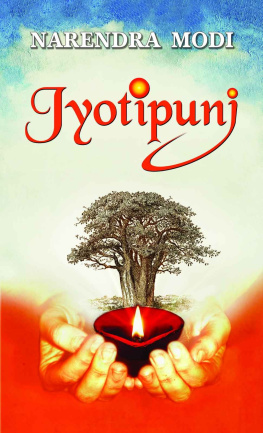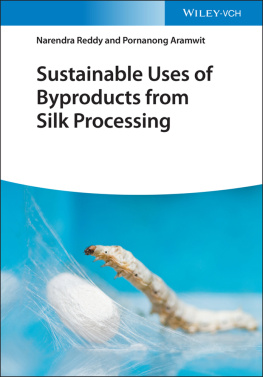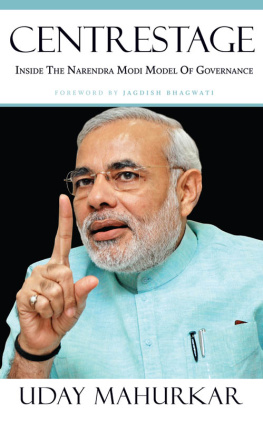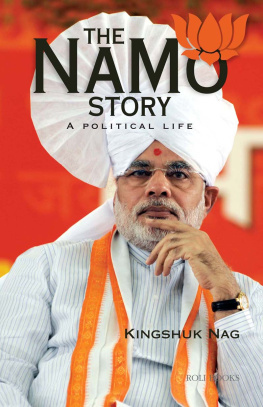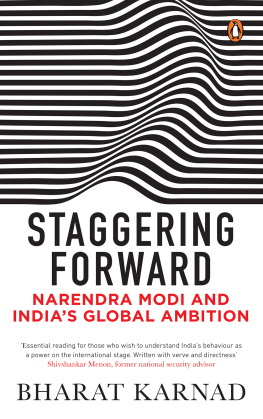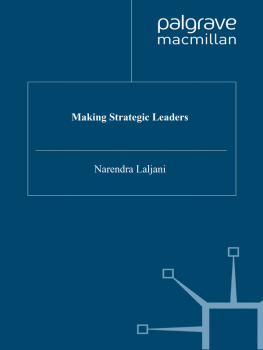PLEASE THINK
NARENDRA DABHOLKAR was a rationalist, author and activist from Maharashtra. A trained medical doctor, he founded and was president of the Andhashraddha Nirmoolan Samiti. Through his writings and speeches, he emphasised the role of rational thinking. He was murdered on 20 August 2013, and triggered by his death, the long-pending Anti-Superstition and Black Magic Ordinance was promulgated in Maharashtra four days later. He was posthumously awarded the Padma Shri in 2014.
JAI VIPRA works on research and advocacy in technology policy, especially on digital monopolies, trade and finance. She is a rationalist and advocates for the rejection of all superstition, and for the use of science and technology for the emancipation of humanity from exploitation. She completed a Masters in Public Policy from the University of Oxford and is currently based in New Delhi.
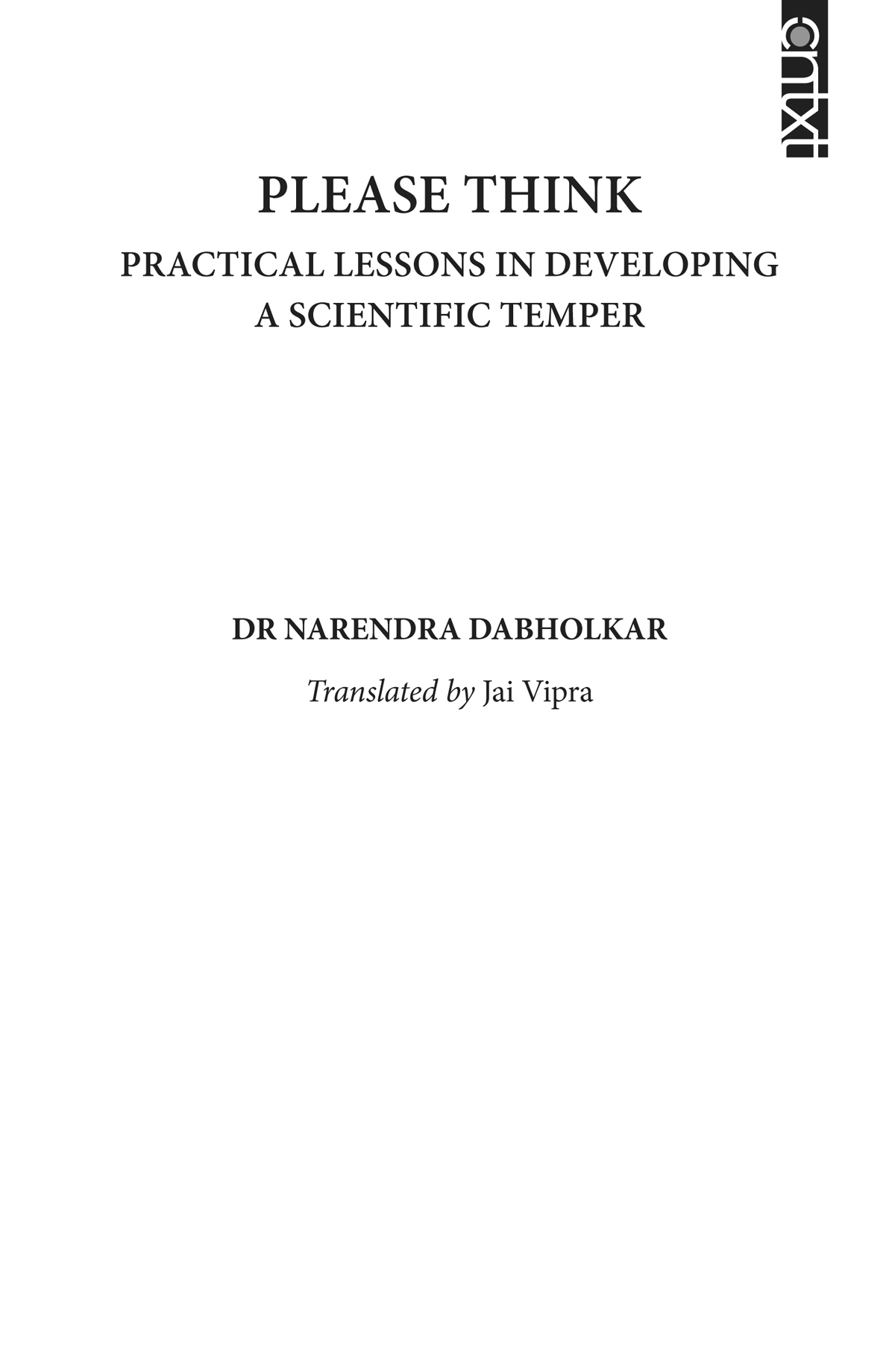
First published in Marathi as Vichar Tar Karal? by Rajhans Prakashan in 1994
First published in English by Context, an imprint of Westland Publications Private Limited, in 2019
1st Floor, A Block, East Wing, Plot No. 40, SP Infocity, Dr MGR Salai, Perungudi, Kandanchavadi, Chennai 600096
Westland, the Westland logo, Context and the Context logo are the trademarks of Westland Publications Private Limited, or its affiliates.
Copyright Shaila Dabholkar, 2019
Translation Copyright Jai Vipra, 2019
ISBN: 9789388754026
The views and opinions expressed in this work are the authors own and the facts are as reported by him, and the publisher is in no way liable for the same.
All rights reserved
No part of this book may be reproduced, or stored in a retrieval system, or transmitted in any form or by any means, electronic, mechanical, photocopying, recording, or otherwise, without express written permission of the publisher.
To dear Mukta and Hamid,
For carrying on the legacy of rational action.
Yours,
Dad
Contents
This is my fourth book on the eradication of superstition.
In my first book, Delusions and Dispelling Them ( Bhram ani Niras ), I talk about many issues related to superstition. In the second book, Superstitions: Question Marks and Full Stops ( Andhashraddha: Prashnachinha va Purnaviram ), I discuss the common questions people have about this issue. The third book, The Destruction of Superstition ( Andhashraddha Vinashaya ), is about the actual experience of the anti-superstition movement.
My fourth attempt, Please Think ( Vichar Tar Karal? ), is slightly different.
We are frequently confronted by incidents that are directly or indirectly related to superstition. We observe them, are fascinated by them. Sometimes, we brand them as occult phenomena. At other times, we assume that they must be caused by something beyond science and bow down before them. We are not in the habit of thinking about them critically or looking for the truth. Our attitude in these situations is one of fear, ignorance and laziness, or of why should I care. Because of this tendency, we may not even notice a grave wrong playing out in our vicinity, forget opposing or countering it.
I wrote a series of articles about such incidents in the Dainik Pudhari and Dainik Lokmat (the Marathwada, Nagpur and Jalgaon editions). Although I realised that people were seeing the point I was making, I stopped writing amidst the hubbub of the movement and its work. I later refined and reworked some of the articles in the series, and wrote some more pieces about our experiences as part of the movement. The common thread was a reflection on real events. Several members of the movement provided valuable assistance for these writings.
However, I began to understand that this was not enough for readers. The scientific temper that the movement and I insist must be employed is a way of thinking that has evolved in the world over the past 400 years. In the many tens of thousands of years that humans have inhabited the earth, this was unprecedented. I, therefore, seek to explore and elaborate on a way of thinking that is a fundamental shift in human history.
When one starts thinking, especially about faith and superstition, religion, with its peculiarities and limitations, makes its presence known. The movements stance on religion is a little different from its position on superstition. Many people feel we are out to destroy religion. Others feel we dont do enough to destroy religion, that we hold back. This is why it was important to clarify our stance, and so the chapter titled Religious Inquiry and Rationalism was included.
Naturally, several people have contributed to this book through their writing and discussions. I have not provided details of all these influences. But I consider it my duty to thank here Bertrand Russell, D.K. Bedekar, P.G. Sahastrabuddhe, Jayant Narlikar, Professor M.P. Rege, G.M. Pawar, P.R. Arde, Prakash Burute, Professor N.V. Kogekar, Shantaram Garud, Arun Tikekar, Dr Vidyadhar Borkar, Dr Shrikant Joshi, Dr N.Y. Dole, V.G. Kulkarni, Sharad Abhyankar and Suniti S.R.
Many thanks to Rajhans Prakashan for their usual kindness.
Science is progressing at a breakneck speed. From investigating the depths of subatomic particles to exploring the expanses of the universe, scientific studies have had a range of stunning impacts on our lives. Medicine, agriculture and communication are just some of the fields that testify to the degree to which we can harness nature for our own benefit. Information technology has made the world a much smaller place and agricultural technology, including pesticides and high-yielding variety seeds, has made the end of hunger a possible goal for the first time in the history of the world.
Our top priority, therefore, ought to be an excellent education in science for our studentsnot only so that they make skilled scientists and technicians, but also so that faith in science can be instilled in the people.
It was once believed that, with technology changing the face of the world, superstition would die a quiet death. However, that has not happened. People today, whether rich or poor, old or young, are even proud of their lack of scientific temper.
Many people are still living in the clutches of superstition. They spend hours at crematoriums, waiting for a crow to signal freedom for a loved ones soul. They see omens everywhere, from the breaking of glass to the falling of stones. Why do prime ministers and presidents pay their respects to a fraudulent godman? Why do people toss perfectly good food into sacrificial fires? Why do they still oppose widow remarriage in the name of caste? What does this downfall of scientific temper and reason tell us?
People fall prey to superstition because they are in constant need of external support. It is natural for the exploited to turn to the deceptive aid or solace of superstition. Yet, the end of superstition is not guaranteed by the end of misery, because we also turn to superstition to fulfil our greed. This makes it a never-ending affliction. Hubris, and the fact that people have never considered the scientific merit of their rituals, blinds them to the futility of superstitious beliefs. They convince themselves with the usual maxim: There must be something to it.

